Note: Yale School of the Environment (YSE) was formerly known as the Yale School of Forestry & Environmental Studies (F&ES). News articles and events posted prior to July 1, 2020 refer to the School's name at that time.
A third of the students from the Yale School of Forestry & Environmental Studies spent the summer working as interns and conducting independent research in countries all over the world.
More than 50 students — who are each required to individually design a summer practicum closely aligned with academic and career goals — traveled abroad for study and career exploration. They volunteered on organic farms in rural England, helped craft guidelines for managing invasive species in the Pacific, and examined how climate change is affecting perceptions of local farmers in Peru and ecosystems from Spain and India. One even helped design a small hotel in Beijing.
We recently checked in with several of them to find out how their summer went, what they learned, and whether they encountered any unexpected surprises. They also shared some insights on how they were able to pay for their travels.
More than 50 students — who are each required to individually design a summer practicum closely aligned with academic and career goals — traveled abroad for study and career exploration. They volunteered on organic farms in rural England, helped craft guidelines for managing invasive species in the Pacific, and examined how climate change is affecting perceptions of local farmers in Peru and ecosystems from Spain and India. One even helped design a small hotel in Beijing.
We recently checked in with several of them to find out how their summer went, what they learned, and whether they encountered any unexpected surprises. They also shared some insights on how they were able to pay for their travels.
Nick McClure, Rwanda
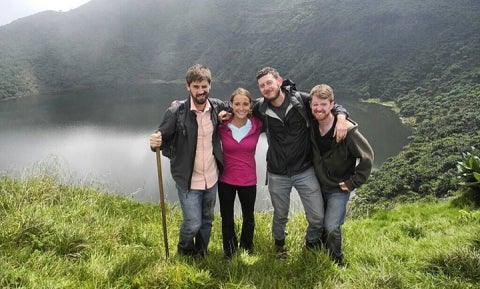 Nick McClure, center right, with friends, including Kristin Lambert ’16 M.E.M., atop Mt. Bisoke, Rwanda.
Nick McClure, center right, with friends, including Kristin Lambert ’16 M.E.M., atop Mt. Bisoke, Rwanda.
Nicholas McClure ’16 M.E.M. worked as a researcher for the Wildlife Conservation Society in Rwanda.
“I worked, along with fellow F&ES second-year student Kristin Lambert, to conduct research on the way businesses impact and depend on ecosystem services provided by Nyungwe and Gishwati forests in western Rwanda. We designed a survey and interviewed representatives of about 30 businesses from eight industries, ranging from tea factories to hydropower companies. We used the data we collected to create a document showing which ecosystem services have potential as the basis for a Payment for Ecosystem Services scheme.
“I had previously served as a Peace Corps Volunteer in Rwanda, and a few times I ran into some of my former students during our research. It was lovely to be able to catch up with old friends unexpectedly!
“I was lucky enough to receive support from both F&ES’s Jubitz Family Endowment and the Carpenter Sperry Internship and Research Fund. This generous support allowed me to fully fund my summer experience with WCS in Rwanda.”
“I worked, along with fellow F&ES second-year student Kristin Lambert, to conduct research on the way businesses impact and depend on ecosystem services provided by Nyungwe and Gishwati forests in western Rwanda. We designed a survey and interviewed representatives of about 30 businesses from eight industries, ranging from tea factories to hydropower companies. We used the data we collected to create a document showing which ecosystem services have potential as the basis for a Payment for Ecosystem Services scheme.
“I had previously served as a Peace Corps Volunteer in Rwanda, and a few times I ran into some of my former students during our research. It was lovely to be able to catch up with old friends unexpectedly!
“I was lucky enough to receive support from both F&ES’s Jubitz Family Endowment and the Carpenter Sperry Internship and Research Fund. This generous support allowed me to fully fund my summer experience with WCS in Rwanda.”
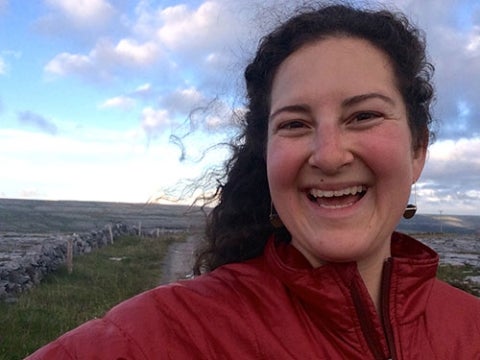
Sara Rose Tannenbaum ’16 M.E.M. interned at a landscape heritage trust called Burrenbeo, located in the West of Ireland. The Burren — a vast limestone karst landscape — is home to 70 percent of Ireland’s native flora, many culturally significant archaeological sites, and grazing traditions that go back thousands of years.
“Tenalach is a Gaelic word referring to the deep connection we feel with the land. I knew I would make time for this through landscape sketching and journaling during my summer in Ireland, but I didn’t imagine a local visual arts group would invite me to give a presentation of my work, or that artistic creativity would become integral to my internship. For one of my projects I worked with Burrenbeo to design and implement a nature diary activity for their environmental education programs. In my last week, after catching frogs in a turlough (disappearing lake) and hunting for fossils on the limestone pavement, I watched the kids fill up their journals with drawings and maps of their experiences.
“My favorite of Burrenbeo’s walks traced an old pilgrimage route from the Burren lowlands to the highlands. Farmers opened gates to let us pass through their fields, a botanist on the tour delighted in the discovery of a rare orchid, and we ended with a potluck in a hazel woodland by a holy well.
“My dream of returning to Ireland to learn about the land use history and stewardship of the Burren was made possible by the generosity of the Carpenter-Sperry and F&ES Summer funds, and by the Burren families who hosted me in their homes.”
“Tenalach is a Gaelic word referring to the deep connection we feel with the land. I knew I would make time for this through landscape sketching and journaling during my summer in Ireland, but I didn’t imagine a local visual arts group would invite me to give a presentation of my work, or that artistic creativity would become integral to my internship. For one of my projects I worked with Burrenbeo to design and implement a nature diary activity for their environmental education programs. In my last week, after catching frogs in a turlough (disappearing lake) and hunting for fossils on the limestone pavement, I watched the kids fill up their journals with drawings and maps of their experiences.
“My favorite of Burrenbeo’s walks traced an old pilgrimage route from the Burren lowlands to the highlands. Farmers opened gates to let us pass through their fields, a botanist on the tour delighted in the discovery of a rare orchid, and we ended with a potluck in a hazel woodland by a holy well.
“My dream of returning to Ireland to learn about the land use history and stewardship of the Burren was made possible by the generosity of the Carpenter-Sperry and F&ES Summer funds, and by the Burren families who hosted me in their homes.”
Ibrahim Amidu, Ghana
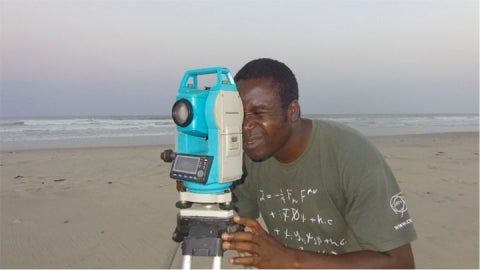
Ibrahim Amidu ’16 M.E.Sc. investigated the economic cost of sea-level rise on low-lying coastal settlements in Accra, the capital city of Ghana.
“My independent research involved spot elevation measurements of five low-lying coastal settlements in Accra from the shoreline to inland. I then estimated — for each 0.25 meter increment in elevation — the possible area of inundated land as sea levels rise. I inquired from Accra real estate agencies the market value of land I worked on, and I collected data on the official 10-year GDP projection from Ghana’s Ministry of Finance. Finally, I inquired from some Ghanaian civil engineers about the cost of constructing a 1-meter-by-1-meter sea defense wall. I will use this information to ascertain whether the coastal settlements could be inundated as sea levels rise and whether Ghana should defend the Accra coast or allow it to be inundated.
“One day I was asked by several residents living in one of the coastal settlements whether my team was demarcating their structures for demolition. The city authorities had (a month earlier) demolished some structures along the water-ways of Accra because a number of people had been killed by a flood that occurred in some parts of the city during a severe rainfall; so a rumor went round that the next demolishing exercise would be conducted along the coast where my team and I were working. It was quite a dicey situation; giving an unpersuasive response could cause the fury of the residents who might prevent us from continuing with our data collection in the area. I told them we were investigating the rate of sea erosion in the community, and that the government wanted that information to help it construct a sea defense wall along the coast! They were excited to hear that plans were afoot to defend their coast; the elderly encouraged us to speed up our work because the sea was fast eroding the land.
“My research was funded by the Hixon Center for Urban Ecology and the F&ES Summer Fund administered by the Office of Career and Professional Development (CDO), the Williams Internship Fund, and the Carpenter-Sperry Research Internship and Research Fund.”
“My independent research involved spot elevation measurements of five low-lying coastal settlements in Accra from the shoreline to inland. I then estimated — for each 0.25 meter increment in elevation — the possible area of inundated land as sea levels rise. I inquired from Accra real estate agencies the market value of land I worked on, and I collected data on the official 10-year GDP projection from Ghana’s Ministry of Finance. Finally, I inquired from some Ghanaian civil engineers about the cost of constructing a 1-meter-by-1-meter sea defense wall. I will use this information to ascertain whether the coastal settlements could be inundated as sea levels rise and whether Ghana should defend the Accra coast or allow it to be inundated.
“One day I was asked by several residents living in one of the coastal settlements whether my team was demarcating their structures for demolition. The city authorities had (a month earlier) demolished some structures along the water-ways of Accra because a number of people had been killed by a flood that occurred in some parts of the city during a severe rainfall; so a rumor went round that the next demolishing exercise would be conducted along the coast where my team and I were working. It was quite a dicey situation; giving an unpersuasive response could cause the fury of the residents who might prevent us from continuing with our data collection in the area. I told them we were investigating the rate of sea erosion in the community, and that the government wanted that information to help it construct a sea defense wall along the coast! They were excited to hear that plans were afoot to defend their coast; the elderly encouraged us to speed up our work because the sea was fast eroding the land.
“My research was funded by the Hixon Center for Urban Ecology and the F&ES Summer Fund administered by the Office of Career and Professional Development (CDO), the Williams Internship Fund, and the Carpenter-Sperry Research Internship and Research Fund.”
Yinong Sun, China
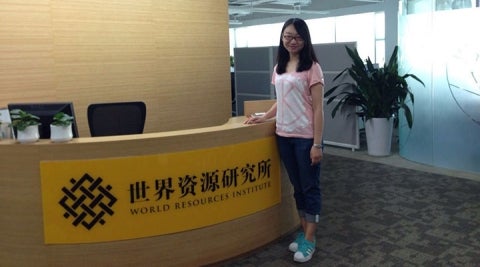
Yinong Sun ’16 M.E.Sc. spent the summer in the Beijing office of the World Resources Institute (WRI) Sustainable Finance Program, where she conducted research on both the international practice of green bank, a new way for clean energy financing, and Chinese overseas investments.
“A green bank is an innovative way for clean energy financing that has been addressed in recent years. By interviewing international experts on green banks and conducting a literature review, I researched the past experiences of international green banks at WRI to help Chinese policy makers examine the potential to establish one in China. I also examined the environmental and social impacts of Chinese overseas investments. We organized a forum on ‘Global Governance and Chinese Overseas Investment’ as a sub-forum of the G20 Think Tank Summit at Beijing, providing a discussion platform for different stakeholders under China’s new ‘One Belt One Road’ initiative.
“One of many memorable experiences was the guest speakers’ discussion during our forum on Chinese overseas investments. People from government, companies, academia, and NGOs had a robust discussion on promoting better environmental and social risk management of Chinese overseas investment. Everyone was enthusiastic and motivated, introducing each party’s difficulties and potential solutions, even though there was still obvious passive attitude. I gradually realized that environmental research is not simply explaining the facts, but has its own social responsibility, and the latter is of the most importance.
“My work was funded by F&ES Summer Fund and the Cameron Speth WRI Award.
“A green bank is an innovative way for clean energy financing that has been addressed in recent years. By interviewing international experts on green banks and conducting a literature review, I researched the past experiences of international green banks at WRI to help Chinese policy makers examine the potential to establish one in China. I also examined the environmental and social impacts of Chinese overseas investments. We organized a forum on ‘Global Governance and Chinese Overseas Investment’ as a sub-forum of the G20 Think Tank Summit at Beijing, providing a discussion platform for different stakeholders under China’s new ‘One Belt One Road’ initiative.
“One of many memorable experiences was the guest speakers’ discussion during our forum on Chinese overseas investments. People from government, companies, academia, and NGOs had a robust discussion on promoting better environmental and social risk management of Chinese overseas investment. Everyone was enthusiastic and motivated, introducing each party’s difficulties and potential solutions, even though there was still obvious passive attitude. I gradually realized that environmental research is not simply explaining the facts, but has its own social responsibility, and the latter is of the most importance.
“My work was funded by F&ES Summer Fund and the Cameron Speth WRI Award.
Alexandra Todorovic-Jones, India
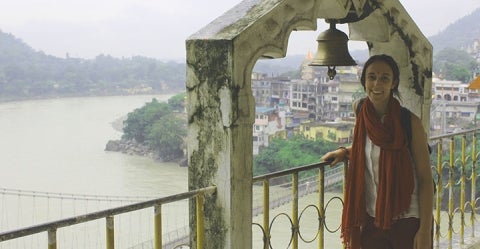
Alexandra Todorovic-Jones ’16 M.F.S.conducted research in Uttarakhand, India, looking at how susceptible banj oak (a widespread and dominant tree in the region) is affected by changes in climate.
“During the summer I worked as a research fellow for a local NGO, the Centre for Ecology, Development, and Research (CEDAR). The NGO was started by Rajesh Thadani ’94 M.F.S.,’99 Ph.D., who also studied under my advisor, Mark Ashton, in the ‘90s. With the help of CEDAR, I was able to collect leaf and tree core data from 24 plots across the lower Himalayas.
“While collecting the data, I stayed in a village called Orakhand and was amazed by the generosity of my homestay hosts and the fearlessness of my field assistants. Day after day, my field assistants helped me gather data, scaling up 16 meter tall trees for leaf samples and trekking up to 20 kilometers a day to find new field sites. After work, our hosts catered to our growling stomachs, filling our plates with large portions of dal, sabji (vegetables), and rice. During our time off, I spent time with my host family over chai and homemade sweets. I'll never forget their endless kindness and ability to make me feel like one of their own.”
“Funding was provided by the Carpenter-Sperry Internship and Research Fund, the Edward C. Armbrecht Jr. Family Fund, and the Tropical Resources Institute Research Award.”
“During the summer I worked as a research fellow for a local NGO, the Centre for Ecology, Development, and Research (CEDAR). The NGO was started by Rajesh Thadani ’94 M.F.S.,’99 Ph.D., who also studied under my advisor, Mark Ashton, in the ‘90s. With the help of CEDAR, I was able to collect leaf and tree core data from 24 plots across the lower Himalayas.
“While collecting the data, I stayed in a village called Orakhand and was amazed by the generosity of my homestay hosts and the fearlessness of my field assistants. Day after day, my field assistants helped me gather data, scaling up 16 meter tall trees for leaf samples and trekking up to 20 kilometers a day to find new field sites. After work, our hosts catered to our growling stomachs, filling our plates with large portions of dal, sabji (vegetables), and rice. During our time off, I spent time with my host family over chai and homemade sweets. I'll never forget their endless kindness and ability to make me feel like one of their own.”
“Funding was provided by the Carpenter-Sperry Internship and Research Fund, the Edward C. Armbrecht Jr. Family Fund, and the Tropical Resources Institute Research Award.”
Gabriela Canales, Bolivia
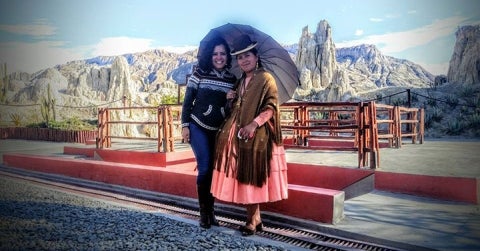
Gabriela Canales ’16 M.E.M. worked as an intern at the United Nations Development Program in Bolivia.
“Most of my career has been focused on negotiations on sustainable development at the international arena; therefore, I wanted to take this opportunity to see by myself how this work that I had done was reflected at the local level. I had the great chance to spend my summer working in a Global Environmental Facility project in Bolivia, related to ‘Life Systems’ of indigenous communities.
“During ten amazing weeks I interviewed people, collected information and facilitated workshops on governance, gender, urban issues and biodiversity in more than 20 rural and indigenous communities of Bolivia. Also, due to several conflicts within and among communities, I developed a guide on facilitating trainings on conflict management for representatives of rural communities and participated in meetings with government authorities, in order to legitimize our actions in the field.
“I had several memorable experiences from this internship. For one, I was part of an incredible and professional team that supported me all throughout my learning process. However, what I enjoyed the most was being able to talk to these communities for whom ‘we make the decisions’ at a different level, frequently not knowing what their real needs are and realizing that one of the most urgent needs is not having biodiversity days, years or decades, but listening to them and understanding their relationship with their surroundings. I spent several weeks in places without electricity, water and several times without a place to sleep. I traveled a few kilometers in more than 10 hours either by scary roads or by river and every time a field trip ended I had stomach infections due to the lack of hygiene in many of these communities; however, I wouldn’t change this life experience for any other single one in the world; now I know that every thing we do and we agree upon will l be useless if there is no real impact on the lives of those people.
“I was very lucky to be funded by CPD as well as Carpenter Sperry Fund. Also, my project was able to support me with some expenses during the field trips.”
“Most of my career has been focused on negotiations on sustainable development at the international arena; therefore, I wanted to take this opportunity to see by myself how this work that I had done was reflected at the local level. I had the great chance to spend my summer working in a Global Environmental Facility project in Bolivia, related to ‘Life Systems’ of indigenous communities.
“During ten amazing weeks I interviewed people, collected information and facilitated workshops on governance, gender, urban issues and biodiversity in more than 20 rural and indigenous communities of Bolivia. Also, due to several conflicts within and among communities, I developed a guide on facilitating trainings on conflict management for representatives of rural communities and participated in meetings with government authorities, in order to legitimize our actions in the field.
“I had several memorable experiences from this internship. For one, I was part of an incredible and professional team that supported me all throughout my learning process. However, what I enjoyed the most was being able to talk to these communities for whom ‘we make the decisions’ at a different level, frequently not knowing what their real needs are and realizing that one of the most urgent needs is not having biodiversity days, years or decades, but listening to them and understanding their relationship with their surroundings. I spent several weeks in places without electricity, water and several times without a place to sleep. I traveled a few kilometers in more than 10 hours either by scary roads or by river and every time a field trip ended I had stomach infections due to the lack of hygiene in many of these communities; however, I wouldn’t change this life experience for any other single one in the world; now I know that every thing we do and we agree upon will l be useless if there is no real impact on the lives of those people.
“I was very lucky to be funded by CPD as well as Carpenter Sperry Fund. Also, my project was able to support me with some expenses during the field trips.”
Emma Akrawi, England
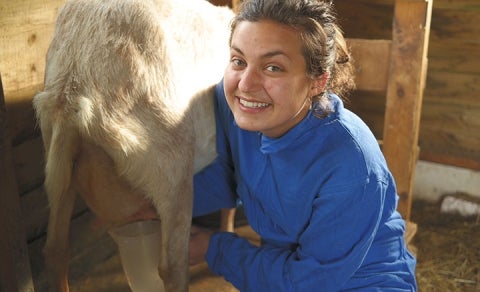
Emma Akrawi ’14 B.A., who is entering her first year as a master of environmental management candidate at F&ES, spent part of her summer in Devon, England as a volunteer for World Wide Opportunities on Organic Farms, or WWOOF.
“As a WWOOFer, you can work just about anywhere in the world, and in exchange for your help, hosts provide you housing and food for the duration of your stay. I chose to volunteer on a smallholding organic farm in rural Devon, England.
“The smallholding was located near the town of Holsworthy, in Devon, England, not far from the Cornish coast. From a bird’s eye view, Ceridwen farm was an oasis of diverse life in the middle of nothing but fields of cattle. When I arrived, there was just one other WWOOFer, and for a time I was the only one, so I was able to help with a variety of tasks. These included weeding, harvesting, preparing for market, planting, feeding the ducks, cooking dinner, and more weeding. Everything we did was by hand. Rob, my mentor, had a large selection of venerable hand tools and just one power tool, a chain saw. He cut the grass with a scythe. My favorite part of the job was getting to sell at market and hear from each of Rob’s loyal customers his or her reason for returning every Friday.
“I left the smallholding with a greater respect for organic growing. Before this summer I found the most convincing argument for organic food to be chemical-related. But growing organic is about more than eliminating toxic chemicals in order to improve health. The real selling point for me now is the soil. Small-scale organic farmers like Rob take care not only to preserve the existing soil, but to build it up and improve it each season, making it naturally more productive for the future. This is in contrast with the degradation of soil that occurs in conventional agriculture. I also learned that milking goats is harder than it looks.
“I was able to secure enough funding to cover my transportation abroad through the Jubitz Family Foundation at F&ES.”
“As a WWOOFer, you can work just about anywhere in the world, and in exchange for your help, hosts provide you housing and food for the duration of your stay. I chose to volunteer on a smallholding organic farm in rural Devon, England.
“The smallholding was located near the town of Holsworthy, in Devon, England, not far from the Cornish coast. From a bird’s eye view, Ceridwen farm was an oasis of diverse life in the middle of nothing but fields of cattle. When I arrived, there was just one other WWOOFer, and for a time I was the only one, so I was able to help with a variety of tasks. These included weeding, harvesting, preparing for market, planting, feeding the ducks, cooking dinner, and more weeding. Everything we did was by hand. Rob, my mentor, had a large selection of venerable hand tools and just one power tool, a chain saw. He cut the grass with a scythe. My favorite part of the job was getting to sell at market and hear from each of Rob’s loyal customers his or her reason for returning every Friday.
“I left the smallholding with a greater respect for organic growing. Before this summer I found the most convincing argument for organic food to be chemical-related. But growing organic is about more than eliminating toxic chemicals in order to improve health. The real selling point for me now is the soil. Small-scale organic farmers like Rob take care not only to preserve the existing soil, but to build it up and improve it each season, making it naturally more productive for the future. This is in contrast with the degradation of soil that occurs in conventional agriculture. I also learned that milking goats is harder than it looks.
“I was able to secure enough funding to cover my transportation abroad through the Jubitz Family Foundation at F&ES.”
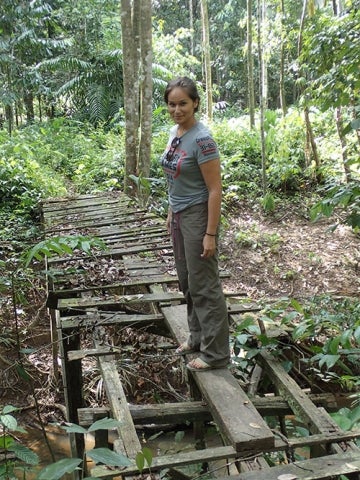
Nina Dewi Hortsmann ’16 M.E.Sc. conducted independent research in East Kalimantna, Indonesia.
“Through Yale’s Environmental Leadership Training Initiative (ELTI), I was able to make contact with a local government research station, Balitek-KSDA, to help lay the groundwork for my research.
“I used ethnographic methods (participant observation and interviewing) in a small village in East Kalimantan. My project is an ethnographic investigation of an agrarian migrant community. Since 1905, Indonesia’s transmigrasi (transmigration) program resettled tens of millions of landless migrants from populous islands, primarily Java, to less densely populated areas, such as Kalimantan (Indonesian Borneo) and Papua. These transmigrant communities have been largely excluded from academic research and my project is the first of its kind to conduct ethnographic research on environmental values and land-use practices among transmigrants. The objective of my study is to understand land-use practices, gauge sentimental attachments to land, and illuminate drivers of land-use change and forest encroachment in East Kalimantan.
“I think for researchers doing independent fieldwork, time is the biggest constraint. It often takes several weeks or months to even understand the dynamics of your site, which pushes most of the data collection to the last month. Unfortunately, I can’t think of any way around this, besides knowing to expect the unexpected and learning how to yield to unfamiliarity and discomfort.
“My research was fully funded by the Tropical Resources Institute and the Yale Southeast Asia Studies Council. I am grateful for their support.”
“Through Yale’s Environmental Leadership Training Initiative (ELTI), I was able to make contact with a local government research station, Balitek-KSDA, to help lay the groundwork for my research.
“I used ethnographic methods (participant observation and interviewing) in a small village in East Kalimantan. My project is an ethnographic investigation of an agrarian migrant community. Since 1905, Indonesia’s transmigrasi (transmigration) program resettled tens of millions of landless migrants from populous islands, primarily Java, to less densely populated areas, such as Kalimantan (Indonesian Borneo) and Papua. These transmigrant communities have been largely excluded from academic research and my project is the first of its kind to conduct ethnographic research on environmental values and land-use practices among transmigrants. The objective of my study is to understand land-use practices, gauge sentimental attachments to land, and illuminate drivers of land-use change and forest encroachment in East Kalimantan.
“I think for researchers doing independent fieldwork, time is the biggest constraint. It often takes several weeks or months to even understand the dynamics of your site, which pushes most of the data collection to the last month. Unfortunately, I can’t think of any way around this, besides knowing to expect the unexpected and learning how to yield to unfamiliarity and discomfort.
“My research was fully funded by the Tropical Resources Institute and the Yale Southeast Asia Studies Council. I am grateful for their support.”
Jacob Bukoski, Thailand and Vietnam
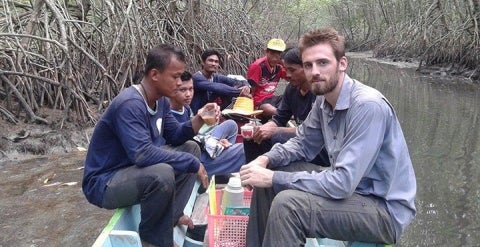
Jacob Bukoski ’16 M.F.S. worked as an independent researcher for an incipient project entitled “Income for coastal communities for protecting mangroves.” The project is jointly implemented by the UN FAO, USAID Lowering Emissions in Asia's Forests (LEAF), and IUCN’s “Mangroves for the Future”1` (MFF) initiative.
“My work was primarily composed of two components: 1) developing a statistically robust model to predict carbon stocks in the mangroves of Southeast Asia, and 2) empirically measuring mangrove carbon stocks at six pilot sites across Thailand and Vietnam to validate the model. My field day activities consisted of hiring teams of 4 to 5 locals, entering the mangrove forest during a 4-to-6-hour window that coincides with the low tide, and collecting both soil samples and data on the vegetation structure of the forest. When not in the field, I analyzed data and compared my site-specific model estimates of carbon stocks with the values I have empirically measured.
“Apart from the joys of being funded to stomp through the mud and climb over jungle-gym-like root systems every day, the most memorable parts of the work were spending 7 to 10 days with four different field teams from both Thailand and Vietnam. In Thailand, I relished the opportunity to test my Thai language skills — by personally training the field teams in how exactly the sampling was to be conducted and leading the teams in the field. Gaining the trust and affections of each team was both fulfilling and offered fun bonuses, such as driving a long-tail boat home at the end of the work day!
“The bulk of the work was very generously funded by Yale’s Tropical Resources Institute, the F&ES Summer Fund, and the Carpenter Sperry Fund. Given that the work is contributing to a larger UN FAO/USAID/IUCN project, I was also able to leverage funds from both UN FAO and USAID LEAF. The combination of funds from the five sources allowed me to maximize the amount of data I could collect in a short period of time.”
“My work was primarily composed of two components: 1) developing a statistically robust model to predict carbon stocks in the mangroves of Southeast Asia, and 2) empirically measuring mangrove carbon stocks at six pilot sites across Thailand and Vietnam to validate the model. My field day activities consisted of hiring teams of 4 to 5 locals, entering the mangrove forest during a 4-to-6-hour window that coincides with the low tide, and collecting both soil samples and data on the vegetation structure of the forest. When not in the field, I analyzed data and compared my site-specific model estimates of carbon stocks with the values I have empirically measured.
“Apart from the joys of being funded to stomp through the mud and climb over jungle-gym-like root systems every day, the most memorable parts of the work were spending 7 to 10 days with four different field teams from both Thailand and Vietnam. In Thailand, I relished the opportunity to test my Thai language skills — by personally training the field teams in how exactly the sampling was to be conducted and leading the teams in the field. Gaining the trust and affections of each team was both fulfilling and offered fun bonuses, such as driving a long-tail boat home at the end of the work day!
“The bulk of the work was very generously funded by Yale’s Tropical Resources Institute, the F&ES Summer Fund, and the Carpenter Sperry Fund. Given that the work is contributing to a larger UN FAO/USAID/IUCN project, I was also able to leverage funds from both UN FAO and USAID LEAF. The combination of funds from the five sources allowed me to maximize the amount of data I could collect in a short period of time.”
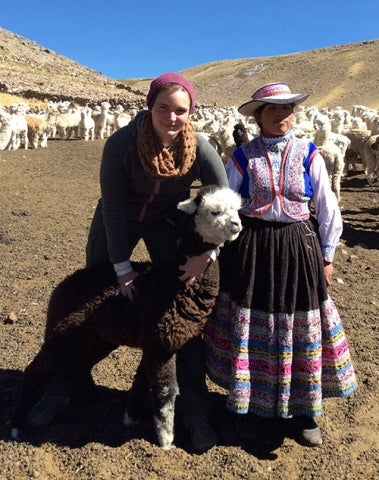
Agnes Walton ’16 M.E.M. worked on an independent research project in Peru focused on how perceptions of climate change in crop centers of origin influence farmer planting and variety selection priorities and behaviors.
“I was lucky to have the support of a Peruvian NGO, ANDES (Asociación para la naturaleza y el desarollo sostenible), which helped me find a field site in the Parque de la Papa, introduced me to the community, and supported my research in many other ways, large and small. I spent another four weeks of my summer working on the fieldwork component of an independent study course from the spring semester. This research took me to four different areas in Peru as well as the capital, Lima, where I investigated the GEF/UNDP Small Grants Programme projects and the underlying factors that allow the ideas they bring to a community to spread and amplify; a process often known as up-scaling.
“In the first few weeks I focused on participant observation of the way potato farming is done in the high Andean communities and how potato diversity features in the daily lives and diets of the people who live here. I stayed with families in the villages to immerse myself in the surroundings and helped them with the harvest, which was well under way when I arrived. During this time I also spent some days with the ANDES team helping them harvest repatriated varieties and watching how their unique community-led conservation project is run. Later in the summer, I moved into a hostel in a small town in the valley and came up to the villages to interview farmers for my project, mostly talking to them very early in the morning before they went to their fields. Some days we were able to convene larger groups of farmers and ran workshops with a 3D model of the area to discuss the spatial distribution of climate change issues and how their planting practices are changing. I also spent time interviewing local agricultural experts in town and going to agricultural fairs to see which varieties were in demand and look at bizarre alpacas.
“Being in the Andes was an incredible experience in itself. It was also quite physically hard and I remember one day when I walked through a valley at around 4,200-meter elevation taking GPS points for potato cultivation and I had to cross a pass between two peaks to get to the next valley. At the top, which must have been 4,700 meters at least, I had this sudden sensation that there was very little air. Looking behind me I could see bright white peaks in the distance, covered in snow despite the intense sun. At that point it really hit me how remote and rare that ecosystem is and how much of a privilege it was to be able to work there.
“I was lucky to be given very generous support from the Tropical Resources Institute at Yale, the Yale Institute for Biospheric Studies (YIBS), the Jubitz Family Fund, the Edward C. Armbrecht Jr. Family Fund, and numerous crowdfunding donors.”
“I was lucky to have the support of a Peruvian NGO, ANDES (Asociación para la naturaleza y el desarollo sostenible), which helped me find a field site in the Parque de la Papa, introduced me to the community, and supported my research in many other ways, large and small. I spent another four weeks of my summer working on the fieldwork component of an independent study course from the spring semester. This research took me to four different areas in Peru as well as the capital, Lima, where I investigated the GEF/UNDP Small Grants Programme projects and the underlying factors that allow the ideas they bring to a community to spread and amplify; a process often known as up-scaling.
“In the first few weeks I focused on participant observation of the way potato farming is done in the high Andean communities and how potato diversity features in the daily lives and diets of the people who live here. I stayed with families in the villages to immerse myself in the surroundings and helped them with the harvest, which was well under way when I arrived. During this time I also spent some days with the ANDES team helping them harvest repatriated varieties and watching how their unique community-led conservation project is run. Later in the summer, I moved into a hostel in a small town in the valley and came up to the villages to interview farmers for my project, mostly talking to them very early in the morning before they went to their fields. Some days we were able to convene larger groups of farmers and ran workshops with a 3D model of the area to discuss the spatial distribution of climate change issues and how their planting practices are changing. I also spent time interviewing local agricultural experts in town and going to agricultural fairs to see which varieties were in demand and look at bizarre alpacas.
“Being in the Andes was an incredible experience in itself. It was also quite physically hard and I remember one day when I walked through a valley at around 4,200-meter elevation taking GPS points for potato cultivation and I had to cross a pass between two peaks to get to the next valley. At the top, which must have been 4,700 meters at least, I had this sudden sensation that there was very little air. Looking behind me I could see bright white peaks in the distance, covered in snow despite the intense sun. At that point it really hit me how remote and rare that ecosystem is and how much of a privilege it was to be able to work there.
“I was lucky to be given very generous support from the Tropical Resources Institute at Yale, the Yale Institute for Biospheric Studies (YIBS), the Jubitz Family Fund, the Edward C. Armbrecht Jr. Family Fund, and numerous crowdfunding donors.”
Daphne Yin, Germany and China

Daphne Yin ’16 M.E.M. was a research intern in the Climate Division at UNIQUE Forestry and Land Use GmbH.
“I interned with UNIQUE forestry and land use, a consulting firm based in Freiburg, Germany’s ecological capital. UNIQUE was contracted to provide technical support for GIZ’s ‘Low-Carbon Land Use in China’ project, which is tasked with identifying land use mitigation options and launching demonstration activities in China. As part of this effort, I researched economic incentives for sustainable forest management, with a focus on China's domestic carbon market and forest sector subsidies.
“While China has carried out epic increases in forest cover, forest health is still quite poor. In addition, the priority placed on forest protection has stunted domestic timber supply despite rising domestic demand, with imports driving deforestation and forest degradation in other countries, particularly Russia and in Southeast Asia. In smoggy Beijing, I sought to develop a stronger understanding of China’s forest sector reforms and opportunities to strengthen domestic timber supply while improving forest health and climate benefits. I interviewed and engaged in discussions with many of the early movers at China’s forest/climate interface: central government; carbon market project developers, verifiers, and Beijing’s emissions trading scheme; conservation NGOs; academia; and other forest sector actors.
“Back in Freiburg, I developed our findings and recommendations into two articles to submit for publication, and contributed to a GIZ report for the Chinese government. I also soaked in the Climate Division’s consulting on other projects throughout the world, bookended by weekends spent hiking in the Black Forest. Verdict on German efficiency: true in terms of people getting work done on time and respecting work-life balance; not true in terms of being a cold bureaucracy. UNIQUE folks love small talk, biking and rollerblading, random spells of guitar throughout the day, and outings to the local strausse or wine tavern.
“My summer was supported by a stipend from UNIQUE and funding from F&ES’s Williams Internships Fund.”
“I interned with UNIQUE forestry and land use, a consulting firm based in Freiburg, Germany’s ecological capital. UNIQUE was contracted to provide technical support for GIZ’s ‘Low-Carbon Land Use in China’ project, which is tasked with identifying land use mitigation options and launching demonstration activities in China. As part of this effort, I researched economic incentives for sustainable forest management, with a focus on China's domestic carbon market and forest sector subsidies.
“While China has carried out epic increases in forest cover, forest health is still quite poor. In addition, the priority placed on forest protection has stunted domestic timber supply despite rising domestic demand, with imports driving deforestation and forest degradation in other countries, particularly Russia and in Southeast Asia. In smoggy Beijing, I sought to develop a stronger understanding of China’s forest sector reforms and opportunities to strengthen domestic timber supply while improving forest health and climate benefits. I interviewed and engaged in discussions with many of the early movers at China’s forest/climate interface: central government; carbon market project developers, verifiers, and Beijing’s emissions trading scheme; conservation NGOs; academia; and other forest sector actors.
“Back in Freiburg, I developed our findings and recommendations into two articles to submit for publication, and contributed to a GIZ report for the Chinese government. I also soaked in the Climate Division’s consulting on other projects throughout the world, bookended by weekends spent hiking in the Black Forest. Verdict on German efficiency: true in terms of people getting work done on time and respecting work-life balance; not true in terms of being a cold bureaucracy. UNIQUE folks love small talk, biking and rollerblading, random spells of guitar throughout the day, and outings to the local strausse or wine tavern.
“My summer was supported by a stipend from UNIQUE and funding from F&ES’s Williams Internships Fund.”
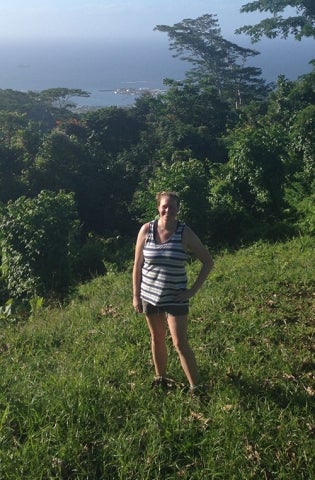
Anne Haas ’16 M.E.M., J.D. spent the summer in Apia, Samoa working with the Secretariat of the Pacific Regional Environment Program (SPREP), an intergovernmental organization charged with the protection and sustainable development of the Pacific Region's environment. Her title was Marine Invasive Species and Protected Areas Assistant.
“My main project was to develop a set of guidelines for the management of marine invasive species in protected areas in the Pacific. The guidelines will be presented to SPREP’s 21 Pacific island member states, voted on, and hopefully adopted as regional policy. Drafting the guidelines involved an extensive literature review of studies and documents related to marine invasive species biology, management, and policy. It also involved reaching out to experts both within and outside of SPREP for feedback on the content and feasibility of the draft guidelines.
“One of the highlights of my SPREP experience was meeting and working with professionals from all over the world, including the Pacific Islands, Australia, New Zealand, Europe and North America, and working in one of the most biodiverse regions on Earth. Of course, I also enjoyed traveling around and exploring the beautiful country of Samoa!
“My summer experience was largely funded by a Yale School of Forestry & Environmental Studies Fellowship and the Williams Internship Fund.”
“My main project was to develop a set of guidelines for the management of marine invasive species in protected areas in the Pacific. The guidelines will be presented to SPREP’s 21 Pacific island member states, voted on, and hopefully adopted as regional policy. Drafting the guidelines involved an extensive literature review of studies and documents related to marine invasive species biology, management, and policy. It also involved reaching out to experts both within and outside of SPREP for feedback on the content and feasibility of the draft guidelines.
“One of the highlights of my SPREP experience was meeting and working with professionals from all over the world, including the Pacific Islands, Australia, New Zealand, Europe and North America, and working in one of the most biodiverse regions on Earth. Of course, I also enjoyed traveling around and exploring the beautiful country of Samoa!
“My summer experience was largely funded by a Yale School of Forestry & Environmental Studies Fellowship and the Williams Internship Fund.”
Meghan Lewis, China
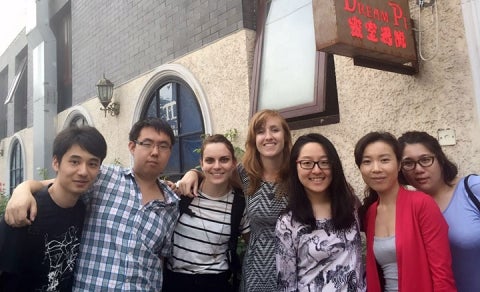 Meghan Lewis, center, with colleagues in Beijing.
Meghan Lewis, center, with colleagues in Beijing.
Meghan Lewis ’16 M.E.M. interned at Elevation Workshop (ELEV), an architecture firm in Beijing, China.
“During the summer I collaborated with colleagues to design a small hotel in Beijing, which is now under construction. The project is one of the first to use a new engineered bamboo product that can help reduce waste by performing similarly to steel and other non-renewable building construction materials. We were able to work closely with the bamboo engineers to design an innovative structure that emphasizes the strengths of the new material.
“Despite only being with my team for three months, I was able to see the project from start to construction and participate in all meetings with the client and engineers. This was an invaluable experience that I did not expect to gain in such a short timeframe. I also absolutely loved working with such an international team! My office included between three and eight people throughout the summer from China, Italy, and Germany. My Chinese colleagues were so understanding and compassionate in aiding us throughout the summer, both during and after work. We all became painfully aware of the necessity of clear communication in a team setting, and I’ll never tackle a project the same way again.
“This internship could not have happened without the help of the F&ES Summer Fund, which covered my flight, housing, and living expenses.”
“During the summer I collaborated with colleagues to design a small hotel in Beijing, which is now under construction. The project is one of the first to use a new engineered bamboo product that can help reduce waste by performing similarly to steel and other non-renewable building construction materials. We were able to work closely with the bamboo engineers to design an innovative structure that emphasizes the strengths of the new material.
“Despite only being with my team for three months, I was able to see the project from start to construction and participate in all meetings with the client and engineers. This was an invaluable experience that I did not expect to gain in such a short timeframe. I also absolutely loved working with such an international team! My office included between three and eight people throughout the summer from China, Italy, and Germany. My Chinese colleagues were so understanding and compassionate in aiding us throughout the summer, both during and after work. We all became painfully aware of the necessity of clear communication in a team setting, and I’ll never tackle a project the same way again.
“This internship could not have happened without the help of the F&ES Summer Fund, which covered my flight, housing, and living expenses.”
Sarah Tolbert, Ghana and DRC
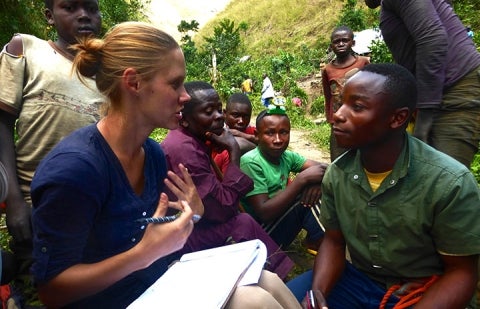
Sarah Tolbert ’16 M.E.M., M.A. worked on two separate projects. The first was with the UN Development Programme’s Global Environment Facilities (GEF) Small Grants Programme (SGP) in Ghana. The second entailed doing research for the Forest Dialogue Fellowship in the Democratic Republic of the Congo (DRC), around Kahuzi-Biega national park and the Bhuryini Community Forest.
“Within the development field, there has recently been a huge push to ‘scale up’ to reach a larger population, to impact government projects and policy. While this sounds great on paper, this new benchmark of success has not been questioned and might not be best for local communities. For the GEF SGP, in fact, this is the opposite of what their original goals were; they are one of the few international NGOs that actually targets small, grass roots projects, to reach the people whom most large development organizations bypass because their budgets are too small and the number of people they impact is not in the thousands. Yet, because they rely on donors, scaling up has become a central objective of their current work. Still, they have not accepted it without question. For my project, I evaluated three sustainable land management SGP projects to 1) understand if they are being replicated either within the community itself or to other communities and 2) if other donors, or government programs are further adopting these projects and replicating them on a much broader scale 3) is larger replication benefiting people and the environment. What I found was that bigger is not always better.
“Then for my TFD research, I moved to the Democratic Republic of the Congo. The DRC is a fascinating place with a wealth of minerals under the ground as well as an astonishing amount of biodiversity. Throw in a recently ended civil war with the prospect of billions of dollars in oil profits and you have a whole host of different opinions on how this landscape should be managed as the region becomes more stable. For my research I interviewed indigenous groups, local NGOs, park officials, and civil society members to better understand why the law was pushed for, what each stakeholder hopes to gain from the law, and if it has the potential to promote good governance and conservation beyond a protected areas framework. I spent most of my days channeling my inner mountain goat as I scaled up and down steep mountains to interview people about their thoughts on forest, rules regulating them, and whether they think a national park would be in their best interest.
“It has been great hearing about how forests are traditionally managed here in the DRC. While this country is well known for its protected areas, there is a lot of variation in the ways that forest are being conserved, including sacred forests. Local customs and tradition should be the starting point, the foundation for any new forest policy and for conservation. Start with what people know and the rest will hopefully follow.
“The Forest Dialogue had a great fellowship opportunity in the DRC so I applied and was able to connect with people in their network. The Coca-Cola Fund, Lindsay Fellowship, the Jackson Institute, and Carpenter-Sperry all are helping support my work this summer too.”
“Within the development field, there has recently been a huge push to ‘scale up’ to reach a larger population, to impact government projects and policy. While this sounds great on paper, this new benchmark of success has not been questioned and might not be best for local communities. For the GEF SGP, in fact, this is the opposite of what their original goals were; they are one of the few international NGOs that actually targets small, grass roots projects, to reach the people whom most large development organizations bypass because their budgets are too small and the number of people they impact is not in the thousands. Yet, because they rely on donors, scaling up has become a central objective of their current work. Still, they have not accepted it without question. For my project, I evaluated three sustainable land management SGP projects to 1) understand if they are being replicated either within the community itself or to other communities and 2) if other donors, or government programs are further adopting these projects and replicating them on a much broader scale 3) is larger replication benefiting people and the environment. What I found was that bigger is not always better.
“Then for my TFD research, I moved to the Democratic Republic of the Congo. The DRC is a fascinating place with a wealth of minerals under the ground as well as an astonishing amount of biodiversity. Throw in a recently ended civil war with the prospect of billions of dollars in oil profits and you have a whole host of different opinions on how this landscape should be managed as the region becomes more stable. For my research I interviewed indigenous groups, local NGOs, park officials, and civil society members to better understand why the law was pushed for, what each stakeholder hopes to gain from the law, and if it has the potential to promote good governance and conservation beyond a protected areas framework. I spent most of my days channeling my inner mountain goat as I scaled up and down steep mountains to interview people about their thoughts on forest, rules regulating them, and whether they think a national park would be in their best interest.
“It has been great hearing about how forests are traditionally managed here in the DRC. While this country is well known for its protected areas, there is a lot of variation in the ways that forest are being conserved, including sacred forests. Local customs and tradition should be the starting point, the foundation for any new forest policy and for conservation. Start with what people know and the rest will hopefully follow.
“The Forest Dialogue had a great fellowship opportunity in the DRC so I applied and was able to connect with people in their network. The Coca-Cola Fund, Lindsay Fellowship, the Jackson Institute, and Carpenter-Sperry all are helping support my work this summer too.”
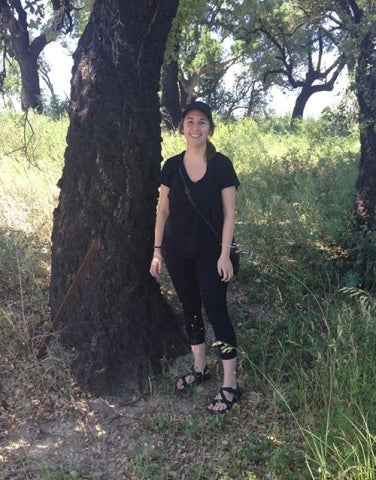
Kyra Prats ’16 M.F.S. led a study in Spain that examined the impact of drought and climate change on the cork oak (Quercus suber).
“Spain is already experiencing increased temperatures and decreased precipitation due to climate change, making the climate even more prone to droughts that are longer and more intense. Extreme drought of course has impacts on woodlands like those of the cork oak, which supports unique and biodiverse ecosystems. And as the name suggests, the cork oak is also the source of the cork used for wine and champagne bottles, so it’s an economically important species in Spain.
“My study, which involved a mixture of field and lab work, specifically focused on drought-related changes to the leaf characteristics such as the leaf size, shape, thickness, and the density of stomata (the pores of the leaf through which CO2 is taken up and water is given off). These traits in fact determine how much CO2 is taken up by the trees, so it’s important to understand how these characteristics have changed due to drought and climate. In order to see present day differences in the leaves, my field sites were located in areas that receive different amounts of precipitation and have different dry season lengths. I was also comparing these present day leaf traits to those from historical herbarium leaf samples to see if leaf traits have changed through time as drought has become even more prevalent in Spain.
“I was based at the Autonomous University of Barcelona, but my field sites were all over Spain — including the regions of Catalonia, Andalusia, Extremadura, and Valencia — which demanded long road trips through the heart of Spain! I traveled with undergrad assistants from Barcelona and we met a lot of local people (and animals) along the way. In fact we may have met more animals than people, including a donkey, a pet goat, and a piglet named Jamoncito (which is Spanish for little ham). We also happened to be traveling and sampling during an impressive heat wave in Spain, with temperatures reaching close to 110 degrees F — a heat that I will never forget!
“I received a lot of help from people at Yale and CREAF, and my funding came from a number of sources, including the F&ES Summer Fund, the Carpenter Sperry Fund, the Yale Institute for Biospheric Studies (YIBS), and the Latin America & Iberian Studies Travel Award.”
“Spain is already experiencing increased temperatures and decreased precipitation due to climate change, making the climate even more prone to droughts that are longer and more intense. Extreme drought of course has impacts on woodlands like those of the cork oak, which supports unique and biodiverse ecosystems. And as the name suggests, the cork oak is also the source of the cork used for wine and champagne bottles, so it’s an economically important species in Spain.
“My study, which involved a mixture of field and lab work, specifically focused on drought-related changes to the leaf characteristics such as the leaf size, shape, thickness, and the density of stomata (the pores of the leaf through which CO2 is taken up and water is given off). These traits in fact determine how much CO2 is taken up by the trees, so it’s important to understand how these characteristics have changed due to drought and climate. In order to see present day differences in the leaves, my field sites were located in areas that receive different amounts of precipitation and have different dry season lengths. I was also comparing these present day leaf traits to those from historical herbarium leaf samples to see if leaf traits have changed through time as drought has become even more prevalent in Spain.
“I was based at the Autonomous University of Barcelona, but my field sites were all over Spain — including the regions of Catalonia, Andalusia, Extremadura, and Valencia — which demanded long road trips through the heart of Spain! I traveled with undergrad assistants from Barcelona and we met a lot of local people (and animals) along the way. In fact we may have met more animals than people, including a donkey, a pet goat, and a piglet named Jamoncito (which is Spanish for little ham). We also happened to be traveling and sampling during an impressive heat wave in Spain, with temperatures reaching close to 110 degrees F — a heat that I will never forget!
“I received a lot of help from people at Yale and CREAF, and my funding came from a number of sources, including the F&ES Summer Fund, the Carpenter Sperry Fund, the Yale Institute for Biospheric Studies (YIBS), and the Latin America & Iberian Studies Travel Award.”
Trevor Thompson ’16 M.E.M. worked as an intern in the Climate Change and Disaster Risk Resilience Division for the UN Development Programme’s Barbados & the Organisation of Eastern Caribbean States (OECS).
“My primary task was to do research to support the initial planning stages of the Japan Caribbean Climate Change Partnership. I researched the eight participating Caribbean nations, focusing on climate change mitigation and adaptation activities that were relevant to areas of focus outlined in the project document.
“My supervisor went on maternity leave halfway through my internship, and the team was not sure what would be appropriate in terms of the rest of my internship. I still wanted to work on this climate change project, and proposed a new deliverable that I could work on for the project. My supervisor and stand-in supervisors approved my proposal. In addition, I met some of my Bajan relatives and their U.S. counterparts for the first time.
“The F&ES Fund was very helpful. Barbados can be very expensive, and the UN still does not pay its interns, so I am grateful for the financial assistance F&ES gave me to help make my internship possible.”
“My primary task was to do research to support the initial planning stages of the Japan Caribbean Climate Change Partnership. I researched the eight participating Caribbean nations, focusing on climate change mitigation and adaptation activities that were relevant to areas of focus outlined in the project document.
“My supervisor went on maternity leave halfway through my internship, and the team was not sure what would be appropriate in terms of the rest of my internship. I still wanted to work on this climate change project, and proposed a new deliverable that I could work on for the project. My supervisor and stand-in supervisors approved my proposal. In addition, I met some of my Bajan relatives and their U.S. counterparts for the first time.
“The F&ES Fund was very helpful. Barbados can be very expensive, and the UN still does not pay its interns, so I am grateful for the financial assistance F&ES gave me to help make my internship possible.”
Published
September 3, 2015